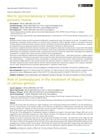 September 2021 in “Медицинский совет”
September 2021 in “Медицинский совет” Proteoglycans, especially in Nourkrin®, can effectively and safely treat hair loss.
January 2022 in “Aesthetic surgery journal”  January 2021 in “Journal of the European Academy of Dermatology and Venereology”
January 2021 in “Journal of the European Academy of Dermatology and Venereology” PrEP doesn't increase STI risk in high-risk men, anti-androgen drugs may lower ICU admission for male COVID-19 patients, a 3-point injection is better for crow's feet, and the 'Geriatric-8' tool could help assess frailty in older skin cancer patients.

Tofacitinib helped a woman with total-body hair loss grow her hair back.
 January 2022 in “Clinical Cases in Dermatology”
January 2022 in “Clinical Cases in Dermatology” Stress can cause temporary hair loss, which usually gets better after the stress is gone.
 1 citations,
May 2021 in “International Journal Of Medical Science And Clinical Invention”
1 citations,
May 2021 in “International Journal Of Medical Science And Clinical Invention” Women with PCOS may have a higher risk of severe COVID-19 due to hormonal imbalances and vitamin D deficiency.
 November 2023 in “Plastic and Reconstructive Surgery – Global Open”
November 2023 in “Plastic and Reconstructive Surgery – Global Open” Americans see hair transplants as valuable for treating hair loss and want them to be more affordable and tailored to each gender.
 5 citations,
November 2021 in “Skin appendage disorders”
5 citations,
November 2021 in “Skin appendage disorders” Hair loss can cause stress and mental health issues, so treatments should address both the physical and psychological aspects, involving a team of dermatologists, psychologists, and hair specialists.
 3 citations,
January 2023 in “European Journal of Information Technologies and Computer Science”
3 citations,
January 2023 in “European Journal of Information Technologies and Computer Science” The machine learning model accurately detected hair loss and scalp diseases using processed images.
 August 2023 in “International Ayurvedic medical journal”
August 2023 in “International Ayurvedic medical journal” Improper diet, lifestyle, and stress are major causes of hair fall.
 12 citations,
October 2021 in “Cells”
12 citations,
October 2021 in “Cells” Targeting a protein that blocks hair growth with microRNAs could lead to new hair loss treatments, but more research is needed.
 11 citations,
October 2021 in “Frontiers in Cell and Developmental Biology”
11 citations,
October 2021 in “Frontiers in Cell and Developmental Biology” Non-coding RNAs are important for hair growth and could lead to new hair loss treatments, but more research is needed.
August 2024 in “Journal of Photochemistry and Photobiology B Biology” Combining light therapy with certain substances improves hair growth in people with hair loss.
 July 2024 in “Pharmaceutics”
July 2024 in “Pharmaceutics” The new hydrogel treatment promotes faster hair growth and better skin health for hair loss.
 April 2024 in “Cell death and disease”
April 2024 in “Cell death and disease” Long COVID causes various long-term health issues and needs better awareness and treatment.
 September 2023 in “British Journal of Dermatology”
September 2023 in “British Journal of Dermatology” Hair regrowth from severe alopecia areata treatment with baricitinib can vary, with faster results in those with shorter hair loss duration.
 August 2023 in “Stem Cell Research & Therapy”
August 2023 in “Stem Cell Research & Therapy” Using adipose-derived stem cell media with minoxidil may help regrow hair in men with hair loss.
 2 citations,
May 2022 in “Cutis”
2 citations,
May 2022 in “Cutis” Taking too much Albendazole can cause hair loss and other serious side effects.
 2 citations,
March 2021 in “Cutis”
2 citations,
March 2021 in “Cutis” Some breast cancer treatments, like taxanes, can cause long-term hair loss.

Some blood thinners and blood pressure medicines can cause hair loss, which usually starts 1 to 6 months after beginning the medication.

Taking too much Albendazole can cause hair loss and other serious side effects.
 September 2024 in “Journal of the American Academy of Dermatology”
September 2024 in “Journal of the American Academy of Dermatology” The New York Times article boosted interest in using low dose oral minoxidil for hair loss.
33 citations,
June 2021 in “Dermatologic Therapy” COVID-19 vaccines can trigger autoimmune flares but are still beneficial for patients with autoimmune conditions.
13 citations,
January 2019 in “Indian Journal of Dermatology” Men with early-onset hair loss have more heart disease risk factors.
 5 citations,
June 2021 in “JAAD Case Reports”
5 citations,
June 2021 in “JAAD Case Reports” Platelet-rich plasma therapy may help treat folliculitis decalvans but benefits might not last without ongoing treatment.
2 citations,
June 2009 in “Journal of the American Academy of Dermatology” The treatment didn't work for the woman's hair loss and skin darkening.
 October 2022 in “Miscellaneous”
October 2022 in “Miscellaneous” A rare, non-cancerous ovarian tumor was successfully treated with surgery, improving the patient's symptoms.
March 2023 in “Civil Medical Journal” Androgenetic alopecia in Nepalese men often starts around age 29, with a possible link to COVID-19 worsening the condition.
 11 citations,
January 2022 in “Journal der Deutschen Dermatologischen Gesellschaft”
11 citations,
January 2022 in “Journal der Deutschen Dermatologischen Gesellschaft” Alopecia areata is a chronic condition causing hair loss, with new treatments targeting the immune system showing promise.
 7 citations,
January 1998 in “PubMed”
7 citations,
January 1998 in “PubMed” Hair loss can cause scalp discomfort.
























